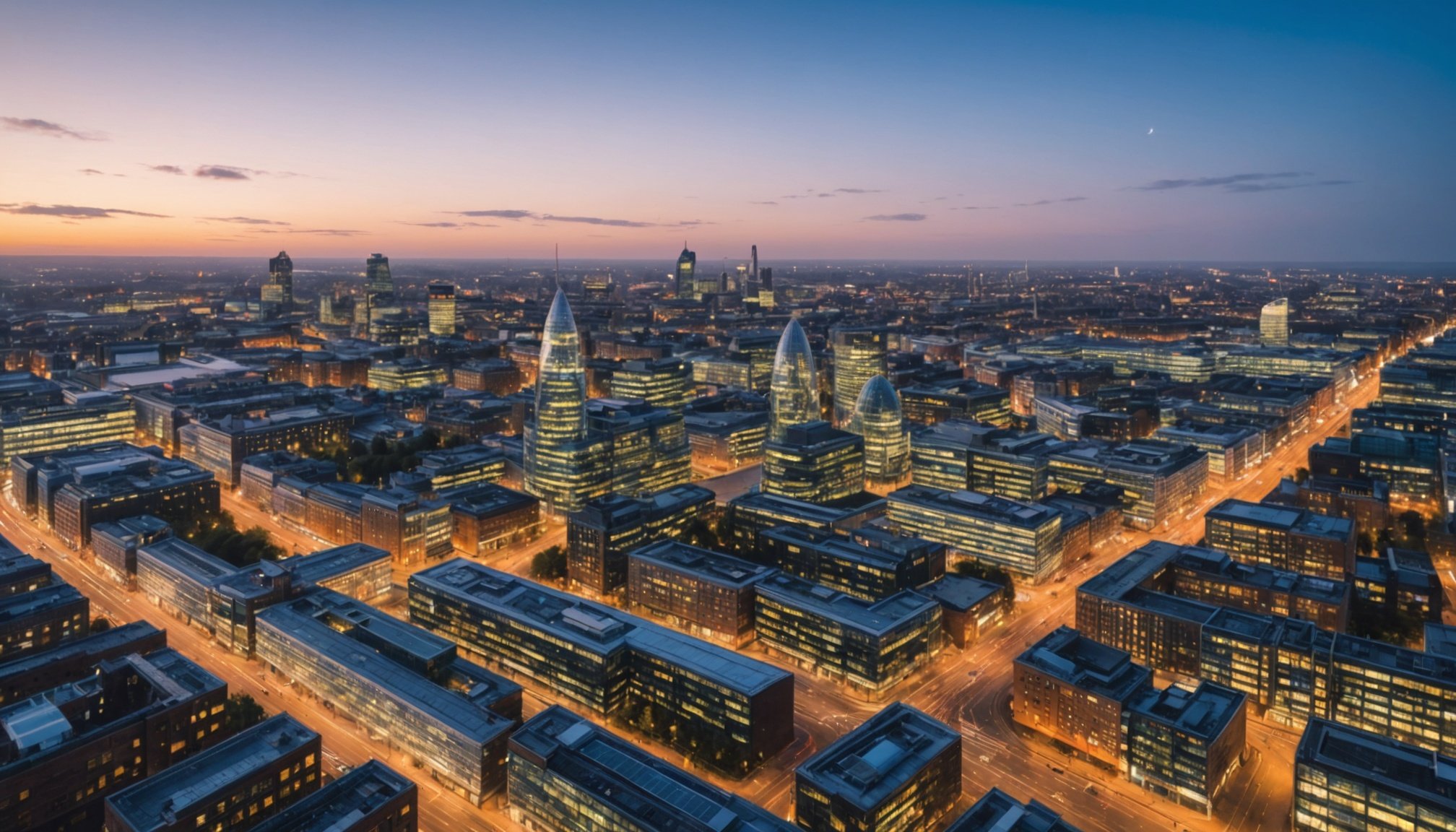Transforming UK Cities: How AI is Pioneering the Future of Urban Development
The integration of artificial intelligence (AI) in urban planning is revolutionizing the way cities in the UK are developed, managed, and sustained. This transformation is not just about adopting new technology; it’s about creating smarter, more sustainable, and more responsive urban environments. Here’s a deep dive into how AI is shaping the future of urban development in the UK.
The Role of AI in Urban Planning
AI has become a cornerstone in urban planning, enabling cities to evolve more efficiently and adapt to modern challenges. In the UK, early adoption of AI techniques has set a global benchmark. AI technologies provide urban planners with innovative tools to manage resources more effectively, optimize traffic flow, and enhance public services.
This might interest you : Top data management strategies for expanding tech startups: best practices unveiled
Data Analytics and Machine Learning
One of the primary avenues of evolution in urban planning is through data analytics and machine learning. These technologies hold the potential to significantly enhance urban infrastructure. Predictive modeling, for instance, allows city planners to foresee traffic congestion and devise strategic solutions in advance, contributing to smoother transit and reduced emissions[1].
Cities like London have implemented AI-driven data analytics systems that manage public resources more efficiently, resulting in improved air quality and reduced energy consumption. For example, London’s adaptive traffic signals and real-time data analysis aim to reduce congestion significantly by dynamically adjusting signal timings based on traffic flow[1].
Have you seen this : Essential Factors for Smooth AI Integration in the UK Healthcare System
Case Studies: AI Implementation in UK Cities
Several UK cities are at the forefront of AI implementation, each demonstrating unique and innovative applications.
London: AI Traffic Management Solutions
In London, AI-driven traffic management has been a game-changer. The city’s adaptive traffic signals and real-time data analysis have significantly reduced congestion and pollution levels. This system not only adjusts signal timings but also facilitates smoother transitions during peak hours, enhancing overall mobility efficiency[1].
Manchester: Predictive Data for Housing Development
Manchester leverages predictive data analytics to address housing needs. By assessing demographic shifts, housing trends, and economic factors, planners can forecast future requirements. This approach ensures that housing developments align with city growth projections, minimizing risks of over- or under-building and optimizing resource allocation[1].
Future Trends in AI-Powered Urban Planning
As AI technology continues to evolve, the innovation in urban planning is set to take an unprecedented leap. Here are some key trends to watch:
Agentic AI and the Internet of Agents (IoA)
Agentic AI, named by Gartner as a top strategic technology trend for 2025, refers to AI systems that can act autonomously and make decisions with minimal human supervision. When combined with the Internet of Agents (IoA), these systems can collaborate seamlessly across heterogeneous environments, solving issues like siloed infrastructures and systems[2].
For example, a Traffic Management Agent driven by Agentic AI can fine-tune signal timings, suggest alternate routes to navigation apps, and coordinate with public transportation authorities to avoid congestion. This proactive approach extends to energy management, pandemic response, and natural disaster management, making cities more resilient and adaptive[2].
Integration with Emerging Technologies
The intersection of AI with emerging technologies like the Internet of Things (IoT) is transforming urban infrastructure. The integration of vast sensor networks could lead to sleek, responsive, and adaptable cities. Smart lighting, automated waste management, and efficient water distribution are just a few examples of what can become standard through AI’s ability to interpret IoT’s real-time data[1].
Potential Benefits of AI in Urban Planning
The benefits of AI in urban planning are substantial, offering unparalleled efficiency and enhanced sustainability.
Urban Development Efficiency
AI supports urban development efficiency by streamlining planning processes. By automating routine tasks and analyzing vast datasets swiftly, planners can allocate resources more effectively. For instance, AI algorithms can predict population growth patterns, guiding the optimal location of infrastructure and services. This proactive approach ensures that cities can grow organically and sustainably, reducing time-consuming revisions and costly errors in urban design[1].
Enhanced Sustainability
AI stands as a cornerstone for eco-friendly urban development. By predicting the environmental impacts of proposed projects, AI enables planners to select greener alternatives, such as energy-efficient buildings or transportation networks. AI can also optimize existing systems for waste management, reducing carbon footprints with precise resource allocation[1].
Practical Insights and Actionable Advice
For cities looking to leverage AI in urban planning, here are some practical insights and actionable advice:
Invest in Data Infrastructure
Building robust data infrastructure is crucial. This includes investing in sensors, IoT devices, and advanced data analytics platforms to capture and analyze real-time data.
Foster Collaboration
Encourage collaboration between different departments and stakeholders. The success of AI in urban planning often depends on the seamless integration of various systems and data sources.
Focus on Ethical AI
Ensure that AI systems are developed and deployed ethically. This involves implementing regulations that ensure transparency, accountability, and fairness in AI systems, building trust among businesses and consumers alike[3].
Real-World Examples and Innovations
Here are some real-world examples and innovations that highlight the impact of AI in UK cities:
Siemens Mobility
Siemens Mobility is utilizing AI to revolutionize urban infrastructure, focusing on optimizing transportation, energy management, and public safety. By analyzing real-time data through AI and IoT integration, Siemens Mobility’s solutions enhance traffic flow, reduce congestion, and ensure efficient energy usage in cities[3].
Green Light Optimal Speed Advisory (Glosa)
In cities like Manchester, Coventry, and York, the Glosa system is being tested. This technology captures traffic data in real time and uses AI to nudge cars to reduce their speed when the light is about to turn, optimizing traffic flow and reducing car emissions[4].
Table: Comparative Benefits of AI in Urban Planning
| Aspect | Traditional Approach | AI-Driven Approach |
|---|---|---|
| Traffic Management | Static traffic signals, manual adjustments | Adaptive traffic signals, real-time data analysis, predictive modeling |
| Energy Consumption | Manual monitoring, periodic adjustments | Real-time monitoring, predictive analytics, automated adjustments |
| Public Safety | Reactive measures, manual surveillance | Proactive measures, AI-driven surveillance, real-time alerts |
| Housing Development | Reactive planning, manual data analysis | Predictive data analytics, forward-thinking planning |
| Environmental Sustainability | Limited data, manual assessments | Comprehensive data analysis, predictive modeling, optimized resource allocation |
| Public Services | Manual resource allocation, periodic reviews | Automated resource allocation, real-time monitoring, optimized public services |
The integration of AI in urban planning is not just a trend; it’s a necessity for creating sustainable, liveable, and responsive cities. As the UK continues to lead in AI adoption, other cities around the world can learn from these innovative approaches. By embracing AI, cities can move from being reactive to proactive, preventing issues before they occur and enhancing the overall quality of life for their citizens.
Quotes from Experts
- “AI is expected to enhance data-driven decision-making in urban environments. Algorithms meticulously analyse traffic patterns, public transport usage, and energy consumption. Consequently, cities could optimise resources, reduce congestion, and cut emissions.” – [Source: Exploring the Future Landscape of AI-Powered Urban Planning in the UK][1]
- “The future of urban life is limitless thanks to the promise and rise of cognitive cities. Through the use of Agentic AI, as well as the Internet of Agents, cities will shift from being reactive to preventing issues before they occur.” – Yousef Khalili, Global Chief Transformation Officer & CEO MEA at Quant[2]
- “The UK has firmly positioned itself as a global AI leader, exemplified by hosting the world’s first AI Safety Summit last year at Bletchley Park. This reflects the UK’s dual focus on maximizing AI’s potential while addressing its risks.” – [Source: AI Innovations in the UK: Top 10 Use Cases & Benefits][3]
List: Key AI Trends in Urban Development
- Automation and Workforce Transformation: AI-driven automation will continue reshaping the workforce, automating routine and repetitive tasks while creating demand for new roles and specialized skills[3].
- Government Investment and Strategic Initiatives: The UK government is ramping up investments in AI research and innovation, supporting businesses with cutting-edge advancements and robust policy frameworks[3].
- Ethical AI and Data Regulation: Ensuring transparency, accountability, and fairness in AI systems is becoming central to its deployment, building trust among businesses and consumers[3].
- Expansion Across Key Industries: AI is being adopted across healthcare, retail, manufacturing, logistics, and finance industries, streamlining operations and enhancing customer experiences[3].
- AI for Sustainability and Climate Action: AI is critical in driving eco-friendly practices across industries, from optimizing energy grids to advancing waste management and tracking carbon footprints[3].
As we look to the future, it’s clear that AI will continue to play a pivotal role in shaping the urban landscape. By understanding and embracing these trends, cities can build sustainable, smart, and resilient environments that benefit both current and future generations.




